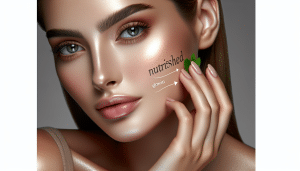Secrets You Might Not Know About Collagen for Glowing Skin
Ella Knight October 21, 2025
Curious about collagen and its role in radiant, healthy skin? Unlock expert-backed insights into collagen benefits, anti-aging routines, and the real science behind supplements. This deep-dive explores how your collagen levels impact beauty, how to protect skin elasticity, and which daily habits can revitalize your natural glow.
Understanding Collagen and Skin Wellness
Collagen is a structural protein that provides strength and elasticity to the skin. Acting as the scaffold beneath the surface, it supports youthful firmness and smoothness. However, daily factors like sun exposure and pollution can disrupt collagen production, which might eventually lead to changes in texture or the development of fine lines. Many individuals seek information on collagen because maintaining healthy levels can directly influence the appearance of skin and overall wellness. (Source: https://www.ncbi.nlm.nih.gov/books/NBK21582/)
In the pursuit of glowing skin, collagen plays a central role in hydration and resilience. Its unique triple-helix structure delivers flexibility while holding skin cells together. As the natural aging process advances, collagen synthesis slows down, which can result in the skin appearing thinner or less vibrant over time. The beauty industry often highlights collagen-rich creams, but the body’s own ability to regenerate this protein is equally important in supporting radiant complexions. (Source: https://www.ncbi.nlm.nih.gov/pmc/articles/PMC3583892/)
Many wellness seekers are surprised to learn that collagen supports not just skin, but also hair, nails, and joint health. Dietary choices, exercise, and overall lifestyle all contribute to preserving collagen reserves. That means simple shifts—like increasing water intake or choosing nutrient-rich meals—may offer a multi-faceted boost to natural beauty. Understanding how collagen works provides a strong foundation for building a better daily skincare routine and embracing confident aging.
The Science Behind Collagen Loss
One of the first questions people ask is why collagen depletes with age. Ultraviolet (UV) rays from the sun, air pollution, and repetitive facial movements all increase the breakdown of collagen fibers. Over time, this can cause fine lines and contribute to a loss of elasticity. Scientists note that protecting the skin from these environmental threats can slow visible signs of aging. Applying daily sunscreen and incorporating antioxidants into your routine may offer extra defense for delicate collagen networks. (Source: https://www.ncbi.nlm.nih.gov/pmc/articles/PMC7029647/)
Collagen loss can start as early as your mid-20s. This ebb is part of the body’s natural progression, but modern stresses like lack of sleep, smoking, and high sugar consumption can speed up the decline. Some studies show that collagen breakdown can even be exacerbated by blue light from screens. Recognizing these influences, experts recommend creating wellness routines that minimize harmful habits and prioritize skin-protecting behaviors. Knowledge is the first step in preserving skin health as long as possible.
Ongoing research explores how lifestyle, genetics, and hormone levels affect collagen’s durability. For some, hormonal changes such as those during menopause can dramatically affect skin firmness and hydration. There are practical ways to counteract this—like eating more vitamin C-rich foods or trying guided face massage for improved circulation. Small everyday actions, when supported by research, offer hope for maintaining skin’s youthful look across changing seasons of life.
Collagen Supplements: Myths and Realities
The hype around collagen supplements can be both exciting and confusing. While marketing often promises dramatic anti-aging effects, scientific studies present a nuanced picture. Hydrolyzed collagen (a processed, easily digestible form) is commonly found in powder and capsule form. Some clinical trials indicate that these supplements may improve skin hydration and elasticity, while others suggest the benefits are modest and may depend on individual absorption. It’s essential to distinguish between evidence-based results and marketing claims. (Source: https://www.ncbi.nlm.nih.gov/pmc/articles/PMC7230814/)
Not all collagen products are created equal. Collagen peptides—smaller protein fragments—tend to be better absorbed than full-length collagen molecules. Several peer-reviewed studies indicate positive outcomes, especially when supplements are paired with nutrients like vitamin C, which helps drive new collagen synthesis. Synthetic fillers or poorly formulated gummies, however, may offer negligible effects. Consumers can make smarter choices by reading labels, checking for third-party certifications, and researching brands. A transparent, science-based approach helps sort fact from fiction in the supplement aisle.
Doctors and dermatologists often remind people that supplements alone cannot replace sound skincare or a healthy diet. Collagen works best as one part of a broader wellness framework. Integrating supplements with daily routines—such as wearing sunscreen, using gentle cleansers, and consuming balanced meals—can maximize the benefits. For those with specific health concerns or sensitivities, a healthcare provider is the ideal resource for making decisions about possible supplementation and safe usage.
Natural Ways to Boost Collagen Production
Nature offers several proven strategies for enhancing collagen without supplements. Eating foods rich in vitamin C, such as berries, peppers, and leafy greens, encourages the body’s natural synthesis of this protein. Other nutrients—like zinc, copper, and amino acids found in legumes and seeds—are also crucial building blocks. Including bone broth, fish, and eggs in meals supports overall protein intake, which may translate into stronger, more resilient skin. Focusing on dietary patterns encourages sustainable, long-term results. (Source: https://www.hsph.harvard.edu/nutritionsource/collagen/)
Lifestyle habits like getting quality sleep, managing stress, and staying hydrated all play supporting roles. Deep sleep is when the body does most of its repair and regenerative work. Chronic dehydration or stress can disrupt skin’s cellular renewal, meaning less optimal collagen replenishment. Practicing mindfulness, drinking plenty of water, and carving out time for relaxation may seem simple but are highly effective for supporting wellness and beauty from within.
Physical activity, especially strength training and regular aerobic exercise, increases overall circulation and nutrient delivery to the skin’s surface. Some individuals also explore facial massage or gentle micro-needling to stimulate collagen formation in targeted areas. Scientific evidence suggests these approaches are promising, though consistency and professional oversight are always recommended. Building a daily self-care routine—centered on natural, low-cost activities—creates compounding benefits for both appearance and overall vitality.
Collagen and Anti-Aging Routines
The relationship between collagen and anti-aging routines is a popular topic in beauty circles. Many people are curious about how to slow down visible aging without harsh treatments. Collagen-based skincare products—like serums and creams—claim to replenish lost proteins, but topical application has its limits, as large proteins may not penetrate deeply. Instead, combining well-formulated products with sun protection and consistent hydration can yield more noticeable results. (Source: https://www.aad.org/public/everyday-care/skin-care-basics/care/anti-aging-skin-care-tips)
Some anti-aging techniques focus on supporting rather than replacing collagen. Retinoids and peptides in skincare routines may help signal the skin to produce more collagen. Regular exfoliation can also help soften fine lines by encouraging cell turnover and revealing fresher skin beneath the surface. These practical steps, when combined with antioxidant-rich serums and gentle moisturizers, support strong, luminous skin regardless of age or background.
Holistic anti-aging routines often look beyond skin-deep solutions. Managing emotional wellness, practicing restful sleep, and avoiding environmental stressors such as harsh winds or pollution make a visible difference. Grouping collagen support habits with mindful daily choices can lead to smaller, everyday victories with lasting and cumulative effects on beauty and confidence. The journey toward graceful aging is unique, but informed self-care empowers every step.
Everyday Habits to Preserve Collagen
Protecting existing collagen is as important as supporting new production. Small steps—like wearing hats, using mineral sunscreen, and seeking shade—have a large impact over time. Even on cloudy days, UV rays can penetrate and hasten collagen degradation. Skipping cigarettes and reducing excess sugar prevent destabilizing enzymes that break down skin’s supportive framework. These prevention strategies are supported by dermatological research and remain accessible to all. (Source: https://www.niams.nih.gov/health-topics/collagen/advanced)
For skin already showing changes, simple routines can still make a difference. Gentle cleansing, regular moisturization, and using products with SPF help defend against additional harm. Nourishing nighttime products and soft fabrics can further reduce irritation or stress. The effort pays off by minimizing discomfort and supporting the skin’s natural healing cycle.
Building routines around collagen preservation encourages a proactive—rather than reactive—mindset. Consistency wins in the long term. By including collagen-friendly behaviors into everyday life, people of all ages can experience improvements that go well beyond surface beauty. The goal is confidence—rooted in an understanding of how skin works and gentle, respectful self-care every day.
References
1. Uitto, J. (2008). The Role of Collagen in Skin Health. Retrieved from https://www.ncbi.nlm.nih.gov/books/NBK21582/
2. Varani, J., Dame, M.K., Rittie, L., et al. (2006). Decreased Collagen Production in Chronologically Aged Skin. Retrieved from https://www.ncbi.nlm.nih.gov/pmc/articles/PMC3583892/
3. Park, K., Lee, Y.S., & Park, S.Y. (2018). Photoaging and Collagen. Retrieved from https://www.ncbi.nlm.nih.gov/pmc/articles/PMC7029647/
4. Jia, Y., et al. (2020). The Effect of Oral Collagen Peptide Supplement on Skin. Retrieved from https://www.ncbi.nlm.nih.gov/pmc/articles/PMC7230814/
5. Harvard T.H. Chan School of Public Health. (n.d.). Collagen. Retrieved from https://www.hsph.harvard.edu/nutritionsource/collagen/
6. American Academy of Dermatology Association. (n.d.). Anti-Aging Skin Care Tips. Retrieved from https://www.aad.org/public/everyday-care/skin-care-basics/care/anti-aging-skin-care-tips







